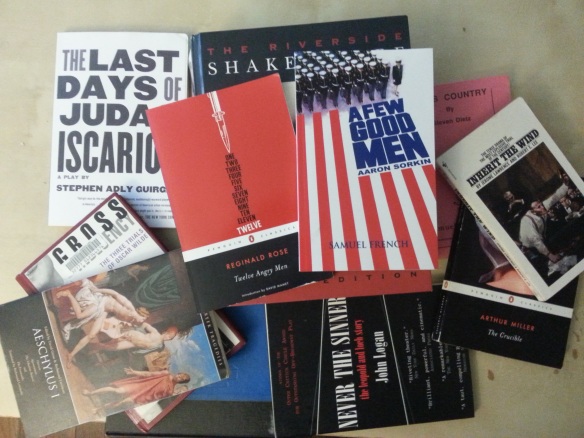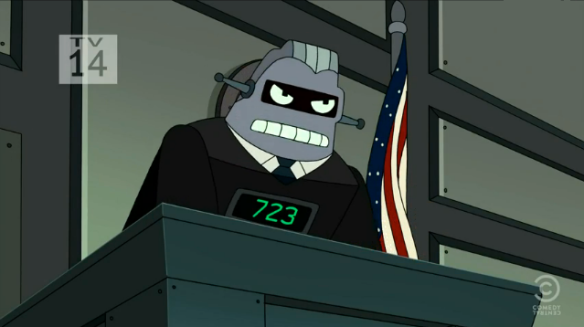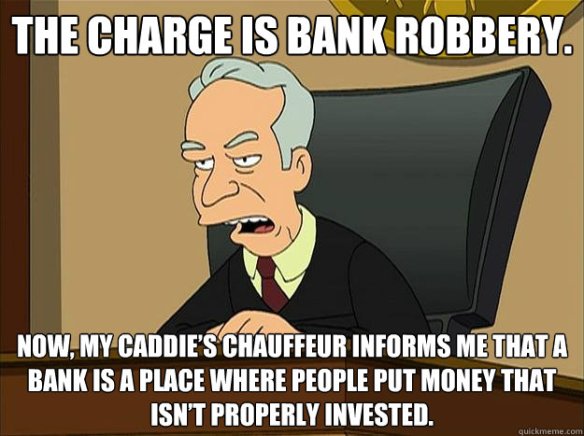Hello again, everyone! I’m glad I caught you today! This is Keith Hock, Production Manager, Technical Director, occasional Dramaturge, and Blogslave for We Happy Few, your favorite DC indie theatre company and your biggest tax write-off. My boss Raven Bonniwell pulled me aside after one of our run-throughs a few days ago and rather forcibly reminded me that writing blog posts is like the only reason they keep me around asked if it wouldn’t be too much trouble for me to throw something together for you folks to read, and seeing as we open THIS VERY EVENING I figured it was probably about time to get something up here.
This is a play about a trial, as you should remember from the small book I wrote about the play’s history a month or so ago (I promise this one will be shorter). Oh, sure, other stuff happens it in, things which I am told by the actors and director are important, and which I will probably talk to you all about once you’ve had a chance to see the play. But the trial is the climactic scene, the core of the Ur-Myth that I just can’t seem to stop talking about, and I wanted to look into what makes the trial so pivotal and interesting. To that end, I gathered as many trial plays as I could get my grubby mitts on and I read them, back-to-back-to-back, while tech rehearsals happened around me, to see what I could learn and turn into a blog post so I could keep my job.

Research
Trials are already very dramatic by their own nature, and playwrights were quick to pick up on that. Playwrights from Aeschylus to Shakespeare to Miller have explored the topic. The stories regularly explore bigotry and injustice within the legal system (Gross Injustice, 12 Angry Men, Trial of the Catonsville Nine), but also examine how trials serve the cause of justice, and why we use them (The Eumenides, A Few Good Men, God’s Country, 12 Angry Men again). Frequently playwrights write about famous or significant cases like the Salem Witch Trials and the Scopes Monkey Trial, and famous lawyers, by which I mean Clarence Darrow, because Clarence Darrow is the only famous lawyer in American history and has had at least 3 plays written about his trials. These accounts of real trials and of Clarence Darrow vary between using the actual words used in the trial (Gross Indecency, God’s Country) to varying levels of fictionalization, from assumptions about what Leopold and Loeb may have said to each other interspersed with real trial language in Never the Sinner to making up a whole new town, trial name, and Clarence Darrow analogue in Inherit the Wind. They confusingly tell us it is both right AND wrong to persecute Jews (Merchant of Venice, God’s Country). Occasionally the playwrights write about themselves, as Daniel Berrigan did about his own trial in The Trial of the Catonsville Nine or, more broadly their art, when Moises Kaufman wrote about the Trials of Oscar Wilde in Gross Indecency. Sometimes the stories are invented from whole cloth, as in A Few Good Men or The Merchant of Venice, or to explore what a trial could uncover in a different story, such as The Last Days of Judas Iscariot or that time in middle school when your English teacher made you put Goldilocks on trial for breaking and entering. It is a form ripe for storytelling, and it can be used to tell all manner of stories.
But in the reading of all these plays I noticed a peculiar thing. The character of the Judge, a key figure in a trial, is tremendously and unaccountably underrepresented, at least in the selection of plays that I read. It is truly astounding how few of the Judges even get names. Lawyers, plaintiffs, witnesses, and defendants have traits and agency and all those things that a character calls for in order to be interesting to the audience. Even juries get to have personality! 12 Angry Men is literally all about jurors butting heads, and both Inherit the Wind and The Trial of the Catonsville Nine include portions of the juror selection process. But the Judges seldom get these, serving instead as the implement of the court; a tool, not a person. The whims, idiosyncrasies, and beliefs of the Judge in a courtroom have a tremendous impact on the course of a trial, but in many of these plays the Judge may as well be a mildly biased robot. The Judge exists in these dramas to dispense courtroom jargon, threaten to “clear the court”, and frequently to overrule the objections of whichever lawyer the audience is supposed to like more.

Judge 723, Futurama.
When the Judge DOES get a sketch of characterization, as I alluded to at the end of that previous paragraph, it is to be either a vocal representative of the status quo or openly antagonistic to the case of the protagonist, or both. The most well-defined Judge in the dozen or so plays that I read for this project would probably be Judge Littlefield in The Last Days of Judas Iscariot, whose only traits are that he hanged himself on a Civil War battlefield, that he absolutely hates the attorney who is bringing the suit on behalf of Judas, and that he ran a chain of successful “Kosher Pizza Parlors in East Purgatory” with Caiaphas the Elder and must therefore recuse himself when Caiaphas takes the stand (it’s a weird play). The Judge in Inherit the Wind doesn’t have a name, but he is more than happy to make pro-religion announcements from the bench in a religiously charged case and to dismiss out of hand every single witness presented by the defense. Likewise the Judge in Gross Indecency, who has the temerity to assert that “There is no worse crime than that with which the prisoner has been charged”, but does not deign to give us his name as the lawyers and witnesses do, even though, since this was a real trial, he actually has one: Alfred Wills. Judge Hawthorne in The Crucible actively wants blood and the Judge in The Trial of the Catonsville Nine cowers behind technicalities and his pretended impartiality to heap scorn on the defendants and influence the court. The venal cowardice and bigotry of these judges is a scathing indictment of the abuse of authority and the perils of an unjust court.

The Hon. Judge Whitey. Also Futurama.
The only Judges who are even remotely sympathetic to the heroes are Captain Julius Randolph in A Few Good Men, more out of irritation with Lieutenant Colonel Jessep (the Jack Nicholson character) than anything else, and Athena in The Eumenides, who is a literal god. And, I suppose, Portia in The Merchant of Venice, although I would assert that the protagonists of that particular piece are, in fact, the villains of the story. (It is telling that of the sympathetic Judges, one was written by Shakespeare and another by Aeschylus, in a time and place where plays were not used as weapons of the counterculture). I won’t pretend this doesn’t make sense from a storytelling perspective; most modern theatre by its very nature tends to run in a countercultural direction, and there is little more countercultural than fighting an unjust court, the literal embodiment of Authority. If you want your villain to be Corrupt Society, it is easy and effective to corrupt your Judge as well, and it is therefore unsurprising that so many writers would use this tool.
Not so for us! CHALK (and its predecessors) continues to invert the status quo, making the Judge in our play matter and moving him to the opposite corner of the alignment chart [LE to CG, for my fellow nerds out there. ed.], giving him free rein to both have unpopular but just opinions and to act upon them. To be fair, our play’s origins also fall in a time and place where theatre was not a tool of the oppressed, and its original moral could easily be rendered as “Confucianism is correct.” Since we are not Song-Dynasty Chinese, however, our moral is somewhat more complex, and our Judge gets to be an active countercultural warrior.
He is also more than a voice delivering instructions to a jury off-stage or a machine programmed to clear courtrooms and overrule objections. We see him not being a Judge, having his own opinions, and in general doing more than simply dispensing justice from the bench. The Judge is a character of crucial importance in the play, second perhaps only to Alma, the ‘mother’ of the child. (Maybe third, if you count a bag of flour wrapped in cloth with no lines. Really more of a MacGuffin than a character, all things considered. But that’s a matter for another blog post.) Far from disappearing behind a one-word combination job title, description, and character name, our Judge (who has a real name, Zeke) creates and defines his own world in his own image. No passive arbiter he, Zeke brings his own beliefs and personalities to the table and forces the people around him to deal with it. He represents passion and energy, excitement and empathy, a significant tonal shift from the traditional interpretation of the Judge on stage.

L-R foreground: Raven Bonniwell (Dave), Ann Fraistat (Mary). background: Josh Adams (Zeke), Louis Davis (Jeren). Photo by Tori Boutin.
And we can’t wait to share it with you! This unorthodox take on the Judge is but one of the many exciting elements of this play that we have been sitting on here for the last few months waiting to share with you, and I am beyond thrilled that you all finally get to see it! Tickets are on sale now, and we run from tonight until July 9th at Capitol Hill Arts Workshop in Eastern Market. I look forward to seeing you all there.